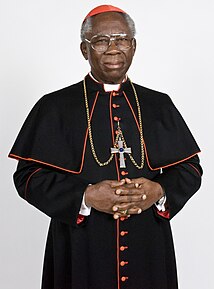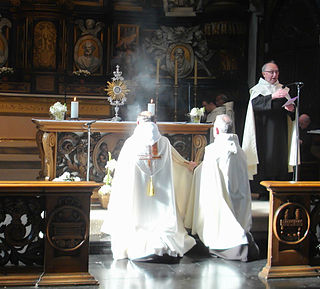Related Research Articles

Mass is the main Eucharistic liturgical service in many forms of Western Christianity. The term Mass is commonly used in the Catholic Church, and in the Western Rite Orthodox, and Old Catholic churches. The term is used in some Lutheran churches, as well as in some Anglican churches. It is rarely, if ever, used by other Protestant churches, such as in Methodism.
The Mass of Paul VI, more commonly called the post–Vatican II Mass, is the Ordinary Form of Mass in the Roman Rite, the form promulgated, after the Second Vatican Council (1962–65), by Pope Paul VI in 1969 and published by him in the 1970 edition of the Roman Missal and the revised 1975 edition, and as further revised by Pope John Paul II in 2000 and published in the third Vatican II edition (2002). In 2007, Pope Benedict XVI said of it: "The Missal published by Paul VI and then republished in two subsequent editions by John Paul II, obviously is and continues to be the normal Form – the Forma ordinaria – of the Eucharistic Liturgy".

The Feast of Corpus Christi, also known as the Solemnity of the Most Holy Body and Blood of Christ, is a Roman Catholic, Anglican, and Western Orthodox liturgical solemnity celebrating the Real Presence of the Body and Blood, Soul and Divinity of Jesus Christ in the elements of the Eucharist. Two months earlier, the institution of the Eucharist at the Last Supper is observed on Maundy Thursday in a sombre atmosphere leading to Good Friday. The liturgy on that day also commemorates Christ's washing of the disciples' feet, the institution of the priesthood and the agony in the Garden of Gethsemane.

Francis Arinze is a Nigerian Cardinal of the Roman Catholic Church. He was Prefect of the Congregation for Divine Worship and the Discipline of the Sacraments from 2002 to 2008. He has been the Cardinal Bishop of Velletri-Segni since 2005. Arinze was one of the principal advisors to Pope John Paul II and was considered papabile before the 2005 papal conclave, which elected Pope Benedict XVI.

Eucharistic adoration is a Eucharistic practice in the Roman Catholic, Anglo-Catholic and some Lutheran traditions, in which the Blessed Sacrament is adored by the faithful. This practice may occur either when the Eucharist is exposed, or when it is not publicly viewable because it is reserved in a place such as a church tabernacle.

The funeral of Pope John Paul II was held on 8 April 2005, six days after his death on 2 April. The funeral was followed by the novemdiales devotional in which the Catholic Church observes nine days of mourning.

Papal inauguration is a liturgical service of the Catholic Church within Mass celebrated in the Roman Rite but with elements of Byzantine Rite for the ecclesiastical investiture of a pope. Since the inauguration of Pope John Paul I, it has not included the 820-year-old (1143–1963) papal coronation ceremony.
The Congregation for Divine Worship and the Discipline of the Sacraments is the congregation of the Roman Curia that handles most affairs relating to liturgical practices of the Latin Church as distinct from the Eastern Catholic Churches and also some technical matters relating to the Sacraments. Its functions were originally exercised by the Sacred Congregation of Rites, set up in January 1588 by Pope Sixtus V.

The Roman Rite is the main liturgical rite of the Latin or Western Church, the largest of the sui iuris particular Churches that make up the Catholic Church. It developed in the Latin language in the city of Rome and, while distinct Latin liturgical rites such as the Ambrosian Rite remain, the Roman Rite has over time been adopted almost everywhere in the Western Church. In medieval times there were very many local variants, even if they did not all amount to distinct rites, but uniformity grew as a result of the invention of printing and in obedience to the decrees of the 1545–1563 Council of Trent. Several Latin liturgical rites that survived into the 20th century were abandoned voluntarily in the wake of the Second Vatican Council. The Roman Rite is now the most widespread liturgical rite not only in the Latin Church but in Christianity as a whole.

The Neocatechumenal Way, also known as the Neocatechumenate, NCW, colloquially The Way, is an itinerary of Christian formation within the Catholic Church. It was formed in Madrid in 1964 by Kiko Argüello and Carmen Hernández.

Benediction of the Blessed Sacrament, also called Benediction with the Blessed Sacrament or the Rite of Eucharistic Exposition and Benediction, is a devotional ceremony, celebrated especially in the Roman Catholic Church, but also in some other Christian traditions such as Anglo-Catholicism, whereby a bishop, priest, or a deacon blesses the congregation with the Eucharist at the end of a period of adoration.

Eucharist here refers to Holy Communion or the Body and Blood of Christ, which is consumed during the Catholic Mass or Eucharistic Celebration. "At the Last Supper, on the night he was betrayed, our Savior instituted the Eucharistic sacrifice of his Body and Blood, ... a memorial of his death and resurrection: a sacrament of love, a sign of unity, a bond of charity, a Paschal banquet 'in which Christ is consumed, the mind is filled with grace, and a pledge of future glory is given to us.'" As such, Eucharist is "an action of thanksgiving to God" derived from "the Jewish blessings that proclaim – especially during a meal – God's works: creation, redemption, and sanctification."
Ecclesia de Eucharistia is an encyclical by Pope John Paul II published on April 17, 2003. Its title, as is customary, is taken from the opening words of the Latin version of the text, which is rendered in the English translation as "The Church draws her life from the Eucharist", with the first words of the Latin translating as "The Church from the Eucharist". He discusses the centrality of the Eucharist to the definition and mission of the Church and says he hopes his message will "effectively help to banish the dark clouds of unacceptable doctrine and practice, so that the Eucharist will continue to shine forth in all its radiant mystery." He explored themes familiar from his earlier writings, including the profound connection between the Eucharist and the priesthood. It drew as well on his personal experiences saying Mass.

The Mass is the central liturgical rite in the Catholic Church, encompassing the Liturgy of the Word and the Liturgy of the Eucharist, where the bread and wine are consecrated and become the body and blood of Christ. As defined by the Church at the Council of Trent, in the Mass, "The same Christ who offered himself once in a bloody manner on the altar of the cross, is present and offered in an unbloody manner." The Church describes the Holy Mass as "the source and summit of the Christian life". It teaches that through consecration by an ordained priest the bread and wine become the sacrificial body, blood, soul, and divinity of Christ as the sacrifice on Calvary made truly present once again on the altar. The Catholic Church permits only baptised members in the state of grace to receive Christ in the Eucharist.

Virgilio Noè was an Italian Roman Catholic prelate and cardinal. He was elevated to the cardinalate in 1991.

Alexander King Sample is an American prelate of the Catholic Church. He has been the eleventh Archbishop of Portland, Oregon, since 2013. He was previously the twelfth Bishop of Marquette, Michigan.
Summorum Pontificum is an apostolic letter of Pope Benedict XVI, issued in July 2007, which specifies the circumstances in which priests of the Latin Church may celebrate Mass according to what he calls the "Missal promulgated by Blessed John XXIII in 1962", and administer most of the sacraments in the form used before the liturgical reforms that followed the Second Vatican Council.

Albert Malcolm Ranjith Patabendige Don, often known simply as Malcolm Ranjith or Albert Malcolm Ranjith, is the ninth and current Archbishop of Colombo, Sri Lanka, serving since 2009. He was elevated to the cardinalate in 2010.
"Adoro te devote" is a Eucharistic hymn written by Thomas Aquinas. Adoro te devote is one of the five Eucharistic hymns, which were composed and set to music for the Solemnity of Corpus Christi, instituted in 1264 by Pope Urban IV as a Solemnity for the Latin Church of the Catholic Church.
References
- "Apostolic Letter Mane nobisum Domine". Apostolic Letter, MANE NOBISCUM DOMINE, of the Holy Father John Paul II to the Bishops, Clergy and Faithful for the Year of the Eucharist. Retrieved December 13, 2005.
- "Solemnity of Corpus Christi – Homily of John Paul II". Mass and Eucharistic Procession for the Solemnity of the Body and Blood of Christ, Homily of John Paul II, Basilica of St John Lateran, Thursday, June 10, 2004. Retrieved December 13, 2005.
- ↑ Archbishop Alfred C. Hughes' Letter on the Year of the Eucharist
- ↑ THE HOLY EUCHARIST UNITES HEAVEN AND EARTH Francis Cardinal Arinze